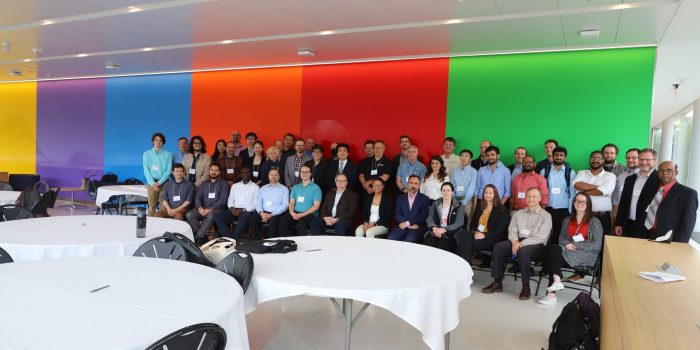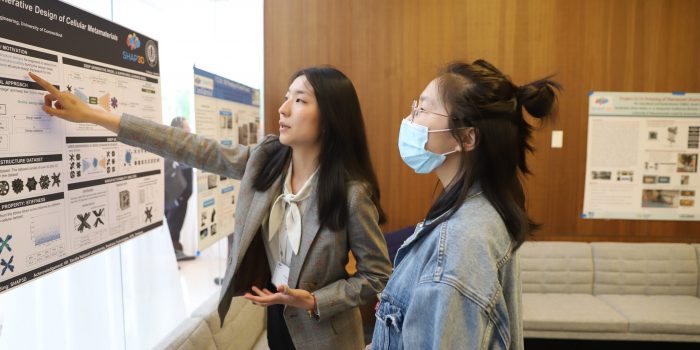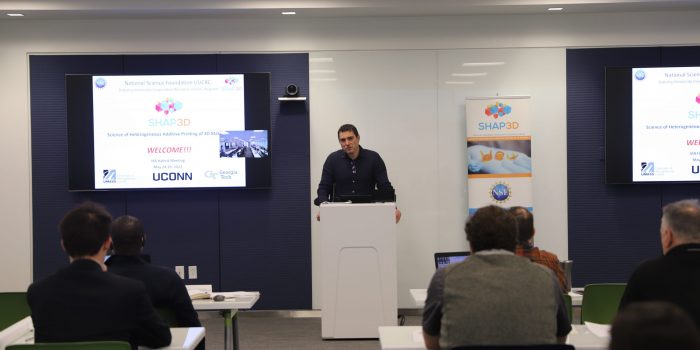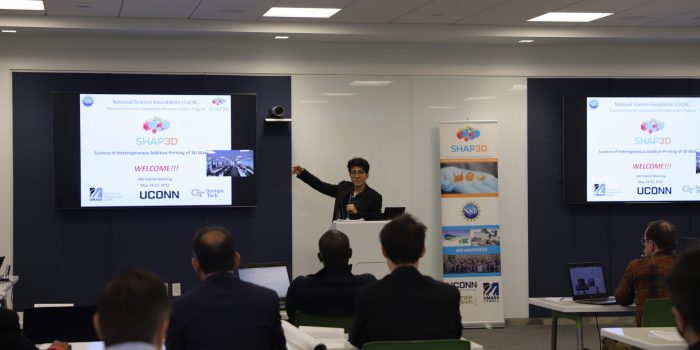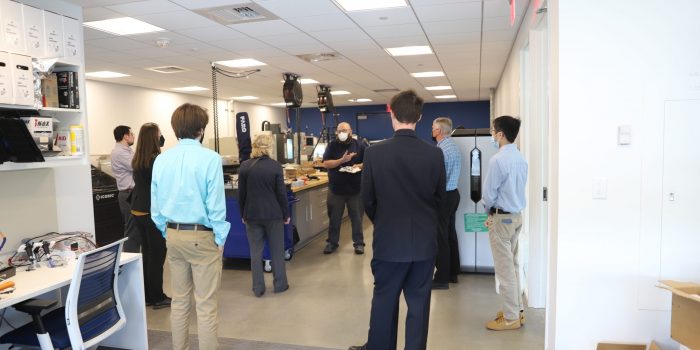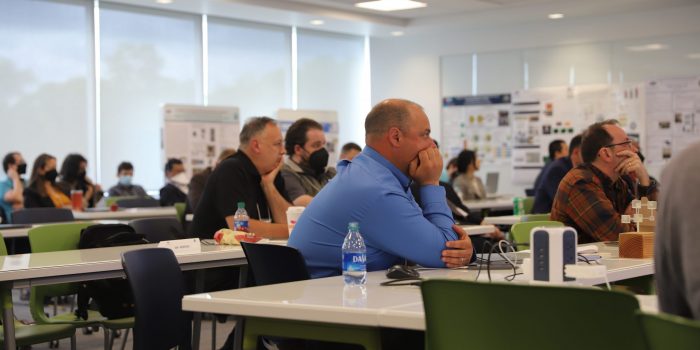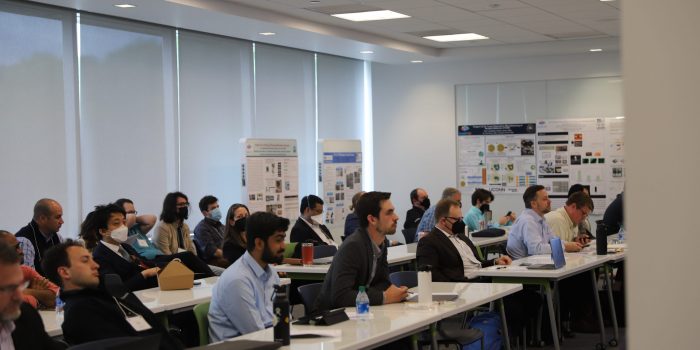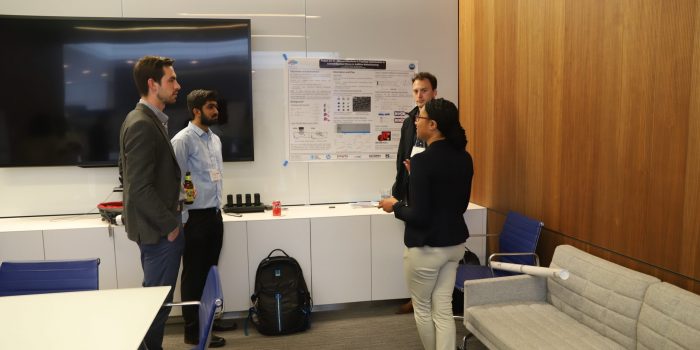IPB at UConn Tech Park
Welcome Digital Media and Design, Master of Fine Arts Students
3D Printing Focused Industry-University Collaborative Research Center Reunites at Tech Park
SHAP3D held their eighth bi-annual Industrial Advisory Board Meeting on May 25 – May 26, 2022, at the Innovation Partnership Building (IPB) | UConn Tech Park.
“It is wonderful to reunite with the SHAP3D family and interact with new center members for the first time in person since they have joined after the pandemic began,” says Prof. Anson Ma, UConn Site Director of the SHAP3D center.
SHAP3D is a collaboration between the University of Massachusetts Lowell, University of Connecticut and Georgia Institute of Technology to create a National Science Foundation I/UCRC focused on 3D printing. The mission of the SHAP3D Center is to perform pre-competitive research providing the fundamental knowledge for 3D printing heterogeneous products that integrate multiple engineering materials with complex 3D structures and diverse functionality. The Center’s diverse membership comprises material developers, 3D printer manufacturers, 3D printing end users, and federal agencies with a stake in the growth of this emerging manufacturing platform.
The meeting was attended by more than 55 faculty members, students, and representatives from private companies, and government agencies. At this meeting, project teams currently funded by the SHAP3D center shared their progress and latest findings. Other highlights of the meeting included rapid fire presentations from members and two invited talks by Professor Timothy Long from the Arizona State University and Professor Matthew Becker from Duke University. UConn SHAP3D site, Proof of Concept Center (POCC), and Pratt & Whitney Additive Manufacturing Center (PW AMC) were all featured in the IPB lab tour. During the reception sponsored by UConn School of Engineering, students who are involved in SHAP3D projects also had the valuable opportunity to present their posters and network with the advisory board members.
Leveraging Stratasys Objet 500 Connex to Advance Multi-material 3D Printing
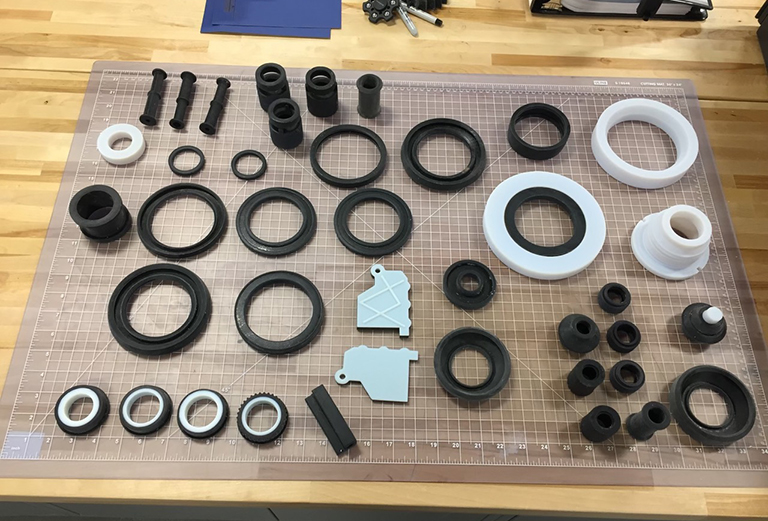
The month of May brought an advanced 3D printer, the Stratasys Objet 500 Connex, to the Science of Heterogeneous Additive Printing of 3D Materials (SHAP3D) lab in IPB. “We are extremely excited about bringing this state-of-the-art 3D printer to IPB and leveraging it to accelerate our multi-material printing research,” says Professor Anson Ma, SHAP3D UConn Site Director. The printer works by jetting and combining different print materials with high precision, thereby achieving a wide range of physical properties through changing the digital print design. This printer also complements the advanced prototyping capabilities that already exist at IPB’s Proof of Concept Center (POCC), directed by Joe Luciani.
Now armed with this powerful printer, Prof. Ma and team aim to expand the choice of materials that can be printed using this machine. Of interest are functional materials with excellent mechanical, thermal and electrical properties. Another topic of interest is to develop in-situ metrology for monitoring the print process in real time and ensuring the quality of 3D printed parts. This is especially important for high performance applications, such as aerospace, where the printed parts must meet stringent requirements. Ideally, all the printed parts must be qualified as they are produced, termed “born-qualified.” Prof. Ma’s long-term ambition is to develop autonomous 3D printers that are intelligent, through working closely with machine learning experts like Prof. Qian Yang from the Department of Computer Science and Engineering at UConn.
In addition to aerospace, the auto industry, and other major manufacturing sectors, organizations that will benefit from the SHAP3D research include 3D printer manufacturers and material suppliers. As the SHAP3D team continues to expand the material selection and improve the robustness of 3D printing, more application opportunities will open up. Professor Ma is eager to get started, although he cautions, “before we can run, we need to learn how to walk.” With the addition of the Objet 500 Connex, the SHAP3D team will be sprinting soon.
Science of Heterogeneous Additive Printing of 3D Materials (SHAP3D) is an Industry/University Cooperative Research Center (I/UCRC) funded by the National Science Foundation to catalyze the technological development of additive manufacturing, also known as 3D printing. The partners are University of Massachusetts at Lowell (UML), University of Connecticut (UC), and Georgia Institute of Technology (GT). Established in July 2018.
National Science Foundation Director Praises Innovation and Entrepreneurship at UConn
‘The Middle of History Being Made’: US Energy Secretary Granholm Lauds UConn in Campus Visit
UConn Tech Park Welcomes Business Development Manager Mike DiDonato

UConn Tech Park extends a warm welcome to our newest team member, Mike DiDonato, who is appointed to the new position of Business Development Manager. In this role, he will focus on developing new relationships and fostering collaborations with external corporations, providing significant opportunities to leverage capabilities and offer novel solutions to technological and business challenges.
Mike joins us from Thermatool in East Haven in the high frequency welding industry, where he started his career after graduating from WPI in 2004. While at Thermatool, his contributions in management spanned multiple and diverse areas of expertise, including digital technology, commercial, manufacturing, business development, and product manager. His breadth of experience, enthusiasm, and excellent communication skills make him an outstanding asset as we grow and develop our organization.
Innovative Computer Simulations in Manufacturing
February 23, 2022 | Melanie Noble, UConn Tech Park
Businesses often face the challenge of keeping up with the latest technology to maintain a competitive edge. A web designer needs high-tech software, farmers need high yield fertilizers, a grocer needs accurate and fast scanners, banks need state-of-the art encryption algorithms.
For small and medium-sized manufacturing companies (SMEs), one of the most critical elements to staying ahead in business lies in incorporating newer digital technologies to develop their product and optimize their process.
Application of computer modeling and virtual testing before making a physical prototype can benefit SMEs by lowering design and manufacturing costs. However, these technologies and advanced training come at a high price that put them out of reach for many.
This is where Connecticut Manufacturing and Simulation Center (CMSC) steps in.
CMSC was established at University of Connecticut (UConn) Tech Park in 2016 in partnership with the U.S. Economic Development Administration (EDA), kicking off with a $2.1 million grant. Matt McCooe, CEO of Connecticut Innovations, expressed confidence in CMSC’s capacity for success, saying, “At the earliest stages of company development, efficiency is integral to success .… This center provides manufacturers with UConn’s expertise, which can have a direct impact on their bottom line.”
In September 2021, the center was awarded an additional EDA grant of $1.2 million (2021-2026) with a match from CT DECD of $150,000. As part of this award, CMSC will have the honor of hosting EDA University Center Economic Development Technical Assistance Programs.

Since its opening, Professor Jeongho Kim, CMSC Center Director, has turned CMSC into an indispensable, state-of-the-art technical shared resource for CT SME computational modeling and simulation. The center has become a foundation for SME innovation and competitiveness in the global economy by training a workforce at a higher level of technical literacy in modeling and simulation. The center has also strengthened its training capability by investing in advanced, high performance 504 HPC computer cores.
To date, CMSC has provided industry support for 40 CT SME manufacturing simulation projects. In addition to modeling capabilities, CMSC has trained a robust workforce pipeline of 1400+ UConn students and 136 working professionals to support the state’s workforce needs.
Kim describes older, outdated manufacturing processes as trial-and-error, time-consuming, and costly. However, with the advanced software modeling now available, the picture has shifted dramatically, and a manufacturing process that once took 1,000 trial and error checks during product design may today take just three or four.
With access to CMSC’s virtual product modeling and process generation and training, SMEs benefit in areas critical to business success: improved quality, reduced time to market, increased productivity, reduced development costs, and manufacturing workforce development.
Kim takes great pride in the center’s achievements. He says, “We are delighted to fulfill the missions of EDA, and to work with Connecticut Department of Economic and Community Development to promote economic and workforce development of the State of Connecticut.”
With over 24 years of experience in finite element modeling and simulation, Kim maintains his keen focus and dedication to the CMSC mission “to provide technical assistance to the Connecticut manufacturing community.” He has even greater goals for CMSC in the coming years, stressing that it is vital to continue making this technology available to a manufacturing community that is actively shifting to a future state in Industry 4.0. Shifting modeling from a 3-D realm to a 4-D realm allows for an even more sophisticated modeling algorithm called “digital twinning” (a digital copy of a physical system), driving a new generation of advanced analytics for SME products and processes.
“The CT Manufacturing Simulation Center (CMSC) mission … supports economic development and job growth in our state. In addition, CMSC’s training of the SME workforce … is an important component of our state’s workforce development strategy.”
– David Lehman, Commissioner, Department of Economic and Community Development
For more information about CMSC and its services, visit cmsc.uconn.edu.
CMSC was established with support from the United States Economic Development Administration and Connecticut Innovations in 2016-2021, and Connecticut Department of Economic and Community Development in 2021-2026.
The EDA’s University Center (UC) establishes UCs that support innovation and high-growth entrepreneurship, resiliency, and inclusiveness.
Jeongho Kim is Professor of Civil and Environmental Engineering at UConn.


